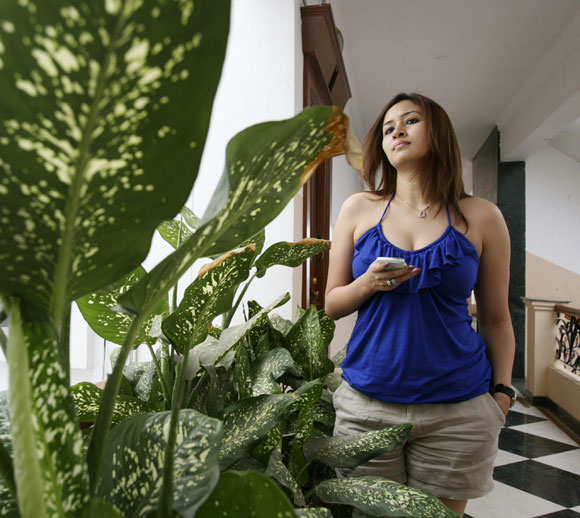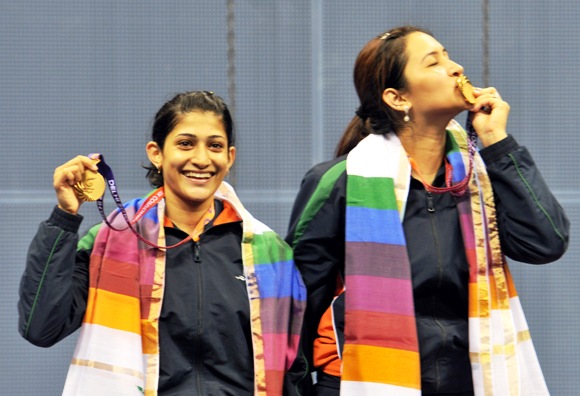 | « Back to article | Print this article |
Shut up! Our sports authorities don't like criticism
Our sports bodies, says Bikash Mohapatra, must get their act correct first, instead of restraining players from venting their displeasure in public.
When it comes to Indian cricket, it is not surprising.
Ask the many reporters who cover India's most popular sport day in and day out and they will tell you how difficult it is to get a player to speak.
Still better, ask a television reporter who is desperate for a byte or two from the players.
The fact that cricket has become too big in this country has made it a twin-edged sword.
While the Board of Control for Cricket in India and its investors have no complain whatsoever when it comes to the huge revenue the sport earns, they would rather do without all the attention that it generates.
Cricket started the trend of restricting players
Nothing sells like cricket. With the billion-plus fans interested in the minutest details about their favourite players and teams, it is palpable that the media goes overboard when it comes to the coverage.
It is given that if the board is content with favourable publicity, it also must take the negative side of things in its stride. Certainly, both should go hand-in-hand.
However, while the authorities have no issues with the regular coverage and highlighting the team’s achievements, they don't want the negatives associated with the industry to come out in public.
Considering cricket these days is a lot more than just matches, it is imperative that aspects like match-fixing, board politics, player behaviour (rather the lack of it), monetary transactions et al also make the headlines on a regular basis.
Now, Indians in general don't like criticism of any kind; toeing the ‘India is great’ line makes them happy.
The board is no different.
So, to prevent any information that is to its detriment coming out in public, it uses various tactics. Restricting the access of the media to a large extent is one method; a gag on the players is another.
The media gag spread to other sports as well
In fact, in recent times the latter is adopted quite frequently. The new lot of players in the Indian team, their talent notwithstanding, aren't quite the educated type - like their predecessors – and, as such, tend to blurt out things. Most of these seemingly innocuous - at the times they were made - statements, on many occasions, end up grabbing the headlines and putting the authorities in a spot of bother.
In order to avoid the same, the board either gags the players completely, thereby refraining them from making any statements, or dictates what they have to say in the media (read press conferences and controlled interviews).
As mentioned at the outset, for those covering cricket on a regular basis, such player gags aren't something unusual.
However, what is bad news is the fact that it has spread to other sports as well.
In recent times, we have seen the All India Tennis Association and Hockey India refrain players from making statements.
The shuttlers had a valid point
The Badminton Association of India and organisers of the upcoming Indian Badminton League are the latest to join the fray. They have barred the players contracted for the league from speaking to the media.
The move follows the controversy that erupted after Jwala Gutta and Ashwini Ponnappa, the former doubles partners and bronze medalists in the 2011 World Championship and gold medalists in the 2010 Commonwealth Games, had their base price reduced by half (from US $50,000 to US $25,000), just ahead of the IBL auction.
The duo, particularly the garrulous Jwala, went about expressing her displeasure in public, making the organisers of the tournament scamper for cover.
The fact that likes of Rupesh Kumar and Sanave Thomas - men's doubles specialists - too cried foul made matters worse, resulting in the gag.
While the point the above players made is valid, the same can't be said about the BAI’s decision.
The player gag is a deterrent for IBL
For a tournament that is yet to flag off, and which has failed to lure many of the top-ranked players, such a restriction will only act as a deterrent.
It goes without saying that such restrictions violate the freedom of the media, one of the founding principles of our constitution. At the same time, it also goes against tenets of the Right to Information (RTI) Act, which most sports bodies (save the BCCI) come under the purview of.
More importantly, it reiterates how intolerant Indians have become against criticism, sport being just a manifestation of the overall phenomenon.
The manner in which sport is managed in this country, there'll only be more negative stories in the days ahead, gag or no gag.
Instead of restraining players from speaking and restricting media access, those in power would do better to get their act right.
But that is asking a bit too much. Isn't it?




